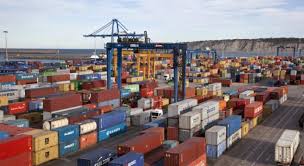A monitoring team set up by the federal government through the Ministry of Trade and Industry is set to begin assessment of the National Trade Facilitation Roadmap at all seaports in Nigeria.
The Nigeria’s Trade Facilitation Committee (NTFC) on the “scoping mission” is made up of members from relevant federal government agencies and the organised private sector and comprises the Nigeria Customs Service, the Standards Organisation of Nigeria (SON), the NPA, the National Export Processing Council (NEPC) and the NACCIMA.
Other members of the trade facilitation team are officials of National Drug Law Enforcement Agency (NDLEA), NAFDAC, and the Nigerian Shippers’ Council.
An insider source told business a.m. that the NTFR team would begin assessment of the port on March 22, 2020, starting eastern ports. The team will begin with Delta Ports in Warri, move to Rivers Port in Port and Onne Port by March 25, before arriving the ports in Lagos on April 2 and 3 to assess success level of the NTFR in Tin Can Island Port and Apapa Port respectively.
The World Trade Organisation Trade Facilitation Agreement (TFA) is mainly hinged on single window platforms that allows for digital interface between the shipper and all relevant agencies of the federal government. The process is reported to eliminate corruption and reduce cost of importation by up 15 percent.
“The TFA is broken into three categories. Category A. has to do with what we are doing now, the processes we have able to install to make the trade process easier and smoother. Category B entails those things we can identify in the trade system that we can do between now and 2022 to facilitate trade, while Category C about what we would want to do but don’t have the capacity and we need intervention from relevant international organisations,” said the source who pleaded anonymity.
“We will be assessing the ports to determine how importers and exporters deal with Nigeria. Hopefully, we will start with Delta Ports in Warri on March 22 and move to Port Harcourt and Onne ports on March 25. We also visit the Calabar Port and on 2nd and 3rd of April, we will be at Tin Can and Apapa ports in Lagos,” the source added.
The Nigeria’s Trade Facilitation Committee (NTFC) was tasked to draft a 3-5 year trade facilitation implementation roadmap with key performance indicators.
According to the source, the indicators will be used to determine what percentage in seamless trade Nigeria has attained, other achievements and gaps are in the country’s trade system.
The Federal Government on October 17, 2017 announced that the National Trade Facilitation Roadmap for Nigeria was ready.
According to the government, the NTFR is a living document that will guide and give direction to trade facilitation across the country, adding that it will boost the ease of doing business in Nigeria campaign by the present administration.
The United Nations Conference on Trade and Development (UNCTAD) is empowering the National Trade Facilitation Committees (NTFC) under the “Transparent Trade Procedures in the region of the Economic Community of West African States (ECOWAS)” project funded by the German Federal Ministry for Economic Cooperation and Development (BMZ), represented by Deutsche Gesellschaft für Internationale Zusammenarbeit (GIZ).
The NTFC presented the roadmap to the Federal Ministry of Industry Trade and Investment in Abuja and the document was received by Edet Akpan, the ministry’s permanent secretary. Akpan explained that trade facilitation was critical in reducing cost and time of doing business.
“The National Trade Facilitation Agreement is consistent with Article 13 (Institutional Arrangements and Final Provisions) of the World Trade Organisation,” according to the Ministry of Trade and Industry.











